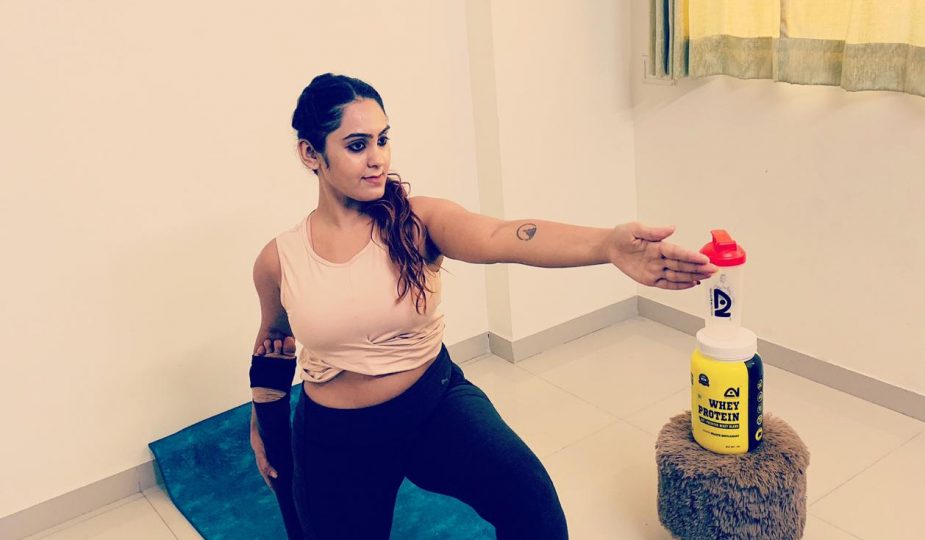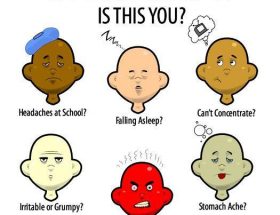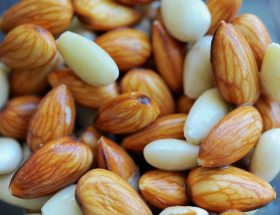What is Collagen & What Does it Do?
Collagen is protein.
So, why do we care about it so much?
Collagen is the key to smooth, young-looking skin and healthy joints.
How Many Types of Collagen Are There?
You may not have known this, but there are 3 types of collagen: Types 1, 2 and 3. A lot of people ask us, “Which types do you take together? Can you take all 3 at the same time? What does each type do?” Great questions!
Types 1, 2 & 3 Collagen
According to Vital Proteins, “all types of collagen will benefit your hair, skin, nails, bones and joints, primarily because all collagen types are made up of beneficial amino acids.” However, you’ll typically see types 1 + 3 packaged together in one bottle, focusing on your skin, bones, hair and nails. Types 1 and 3 make up 90% of the collagen in your body, can minimize wrinkles, improve skin elasticity, support bones, correct damaged nail beds, thicken fine hair and improve your body’s circulation. Typically, when you see collagen supplements, what you’ll see is types 1+3.
Type 2 collagen, on the other hand supports your joint/cartilage health and function. It helps reduce popping knees, and helps support your jaw, back, and joints. A lot of people don’t realize that joint pain, popping knees, and weakened cartilage is a result of lacking type 2 collagen, and assume it is an unavoidable part of the aging process. Well, it isn’t, and you can fight back with a Type 2 collagen supplement!
What Causes Collagen Production To Slow Down?
Even though collagen is naturally occurring in the human body, it’s essential to supplement it as we age because collagen production slows down significantly as we get older. Actually, after age 30, collagen production begins to significantly decline. By age 45, collagen production decreases 25%, and by age 60 it decreases by more than 50%. As our body’s collagen production slows down, we begin to notice saggy, aging skin, fine lines and wrinkles, and weakened joint cartilage.
Aging is the #1 cause of diminished collagen production. Even though you can’t stop the aging process altogether, there ARE things that damage your level of collagen production that you’re totally able to control! Avoiding the following things will keep your collagen production levels higher:
- Smoking
- Eating too much sugar after the age 30
- Overexposure to sunlight
- Stress
- Poor Diet
Can I Boost My Collagen Production?
Yes, there IS a bright side! You can stimulate your body’s natural collagen production to help keep these aging side effects at bay. There are nutritional, procedural, and supplemental methods to promote collagen production.
Nutritional:
As we always say at Get Healthy U: Nutrition before supplements! There are certain nutrients (that you may not know much about yet) found in common, delicious foods that promote collagen production.
Proline (an amino acid found in meat, cheese, soy, cabbage, and eggs)
Copper (found in fish, red meat, nuts)
Vitamin A (found in meat and beta-carotenes like sweet potatoes)
Vitamin C (found in oranges, leafy greens, red and green veggies)
Anthocyanidins (found in berries, cherries)
Procedural:
There are also external things you can do to control your collagen production! There are both procedures and products (typically prescribed by a dermatologist) that can help, too.
Laser Therapy- Laser treatments are a great, non-surgical way to stimulate collagen production and use laser and light energy to reduce the appearance of fine lines and skin elasticity.
Retinoic Acid (Vitamin A)- This member of the retinoid family helps kick cells into gear and promote cell production in the skin and stimulates both collagen and elastin production.
Skin Fillers- Collagen injections are a common cosmetic procedure that helps remove fine lines and wrinkles from the face and can help with scarring from acne.
Supplemental:
Collagen Drinks: For a long time, collagen drinks have existed, and promised to make your skin, hair and nails look better than ever, but experts have doubted this claim because they thought it was unlikely that the body would actually absorb the collagen. Recently, however, the results have been considerably more promising. Many studies have cited women who consumed collagen drinks showed significant improvement in the thickness and elasticity of their skin!
Collagen Supplements: Collagen supplements have been around forever. Now you don’t just see them in the aisles of specialty vitamin stores, but in your local drugstores! But do they work? There was a large study in early 2014 conducted by the University of Kiel’s Department of Dermatology that showed 65% of women having significantly elevated levels of collagen and reduction in wrinkles after 8 weeks of taking a collagen supplement.
What’s The Difference Between Collagen & Whey Protein?
It’s a question we get asked often and what is really comes down to is the difference between the amino acid profile. Take a look at the examples below (remembering that 1,000mg is the same as 1 gram).
A chart of the amino acid breakdown of collagen versus whey protein
So, looking at Vital Proteins Collagen, you can see that it contains a high value of glutamic acid (2.2 grams), hydroxyproline (2 grams) and proline (2 grams). These particular amino acids primarily benefit your hair, skin and nails.
On the flip side, BiPro Whey Protein contains a high value of isoleucine (1.1 grams), leucine (2.5 grams) and valine (1.1 grams) which are really good for muscle recovery.
Collagen, also, contains only has 8 out of the 9 essential amino acids whereas whey has all the essential amino acids
Thus, you can see that they both have incredible benefits, they just focus on slightly different objectives. And yes, you can take both in the same day










Awesome post! Keep up the great work! 🙂
Great content! Super high-quality! Keep it up! 🙂
Title
[…]one of our visitors not too long ago encouraged the following website[…]
Title
[…]the time to read or go to the subject material or web-sites we’ve linked to beneath the[…]
Title
[…]Here are several of the web pages we recommend for our visitors[…]
Title
[…]although sites we backlink to beneath are considerably not associated to ours, we feel they’re truly worth a go by means of, so possess a look[…]
Title
[…]Here are some of the internet sites we suggest for our visitors[…]
Title
[…]just beneath, are a lot of totally not connected internet sites to ours, having said that, they’re surely worth going over[…]
Title
[…]Here is an excellent Blog You might Obtain Exciting that we Encourage You[…]
Title
[…]we like to honor several other web sites on the internet, even if they aren’t linked to us, by linking to them. Beneath are some webpages really worth checking out[…]
Title
[…]check beneath, are some entirely unrelated internet websites to ours, nonetheless, they may be most trustworthy sources that we use[…]
I have read your article carefully and I agree with you very much. So, do you allow me to do this? I want to share your article link to my website: gateio
Thank you for your sharing. I am worried that I lack creative ideas. It is your article that makes me full of hope. Thank you. But, I have a question, can you help me?
Your article helped me a lot, is there any more related content? Thanks!
Your point of view caught my eye and was very interesting. Thanks. I have a question for you.
Your point of view caught my eye and was very interesting. Thanks. I have a question for you. https://www.binance.com/pt-BR/register?ref=W0BCQMF1
I am sorting out relevant information about gate io recently, and I saw your article, and your creative ideas are of great help to me. However, I have doubts about some creative issues, can you answer them for me? I will continue to pay attention to your reply. Thanks.
Your point of view caught my eye and was very interesting. Thanks. I have a question for you. https://accounts.binance.com/pt-BR/register-person?ref=PORL8W0Z
Thanks for sharing. I read many of your blog posts, cool, your blog is very good.
Your point of view caught my eye and was very interesting. Thanks. I have a question for you. https://accounts.binance.com/en/register?ref=P9L9FQKY
I may need your help. I’ve been doing research on gate io recently, and I’ve tried a lot of different things. Later, I read your article, and I think your way of writing has given me some innovative ideas, thank you very much.
I may need your help. I tried many ways but couldn’t solve it, but after reading your article, I think you have a way to help me. I’m looking forward for your reply. Thanks.
Your point of view caught my eye and was very interesting. Thanks. I have a question for you. https://accounts.binance.com/sv/register?ref=DB40ITMB
I don’t think the title of your article matches the content lol. Just kidding, mainly because I had some doubts after reading the article. https://accounts.binance.com/pt-BR/register-person?ref=DB40ITMB
I am currently writing a paper that is very related to your content. I read your article and I have some questions. I would like to ask you. Can you answer me? I’ll keep an eye out for your reply. 20bet
I wanted to express how much I admire your article. The clarity of your post is truly impressive, and it’s evident that you possess expertise on this subject. If it’s acceptable to you, Thank you and I’d like to take the opportunity to subscribe to your feed in order to stay informed about your future posts. Thanks a million and please carry on the gratifying work. By the way I am a big fan of NBA Basketball Games & Teams enjoying today’s game highlights.
I do not even know how I ended up here but I thought this post was great I do not know who you are but certainly youre going to a famous blogger if you are not already Cheers
Thanks for sharing. I read many of your blog posts, cool, your blog is very good. https://www.binance.com/fr/register?ref=RQUR4BEO
I don’t think the title of your article matches the content lol. Just kidding, mainly because I had some doubts after reading the article. https://www.binance.info/lv/join?ref=V2H9AFPY
Can you be more specific about the content of your article? After reading it, I still have some doubts. Hope you can help me. https://www.binance.info/zh-TC/join?ref=YY80CKRN
Thank you for your sharing. I am worried that I lack creative ideas. It is your article that makes me full of hope. Thank you. But, I have a question, can you help me? https://accounts.binance.com/id/register?ref=VDVEQ78S
You’ve articulated this so well!
This article was incredibly insightful! I was captivated by the thoroughness of the information and the clear, engaging way it was delivered. The depth of research and expertise evident in this post is remarkable, significantly elevating the content’s quality. The insights in the opening and concluding sections were particularly compelling, sparking some ideas and questions I hope you will explore in future articles. If there are any additional resources for further exploration on this topic, I would love to delve into them. Thank you for sharing your expertise and enriching our understanding of this subject. I felt compelled to comment immediately after reading due to the exceptional quality of this piece. Keep up the fantastic work—I’ll definitely be returning for more updates. Your dedication to crafting such an excellent article is highly appreciated!
This piece was incredibly enlightening! The level of detail and clarity in the information provided was truly captivating. The extensive research and deep expertise evident in this article are truly impressive, greatly enhancing its overall quality. The insights offered at both the beginning and end were particularly striking, sparking numerous new ideas and questions for further exploration.The way complex topics were broken down into easily understandable segments was highly engaging. The logical flow of information kept me thoroughly engaged from start to finish, making it easy to immerse myself in the subject matter. Should there be any additional resources or further reading on this topic, I would love to explore them. The knowledge shared here has significantly broadened my understanding and ignited my curiosity for more. I felt compelled to express my appreciation immediately after reading due to the exceptional quality of this article. Your dedication to crafting such outstanding content is highly appreciated, and I eagerly await future updates. Please continue with your excellent work—I will definitely be returning for more insights. Thank you for your unwavering commitment to sharing your expertise and for greatly enriching our understanding of this subject.
This piece was incredibly enlightening! The level of detail and clarity in the information provided was truly captivating. The extensive research and deep expertise evident in this article are truly impressive, greatly enhancing its overall quality. The insights offered at both the beginning and end were particularly striking, sparking numerous new ideas and questions for further exploration.The way complex topics were broken down into easily understandable segments was highly engaging. The logical flow of information kept me thoroughly engaged from start to finish, making it easy to immerse myself in the subject matter. Should there be any additional resources or further reading on this topic, I would love to explore them. The knowledge shared here has significantly broadened my understanding and ignited my curiosity for more. I felt compelled to express my appreciation immediately after reading due to the exceptional quality of this article. Your dedication to crafting such outstanding content is highly appreciated, and I eagerly await future updates. Please continue with your excellent work—I will definitely be returning for more insights. Thank you for your unwavering commitment to sharing your expertise and for greatly enriching our understanding of this subject.
먹튀검증소: https://nktoday.kr/
[토토사이트] 불법 먹튀 사이트를 차단하고 안전한 온라인 도박 환경을 조성하세요! 먹튀 사이트 차단 방법, 검증된 사이트 목록, 안전놀이터 추천 등을 제공합니다.
먹튀감별사: https://www.dappc.kr/
My brother suggested I might like this blog. He was totally right. This post actually made my day. You can not imagine simply how much time I had spent for this info! Thanks!
Attractive section of content I just stumbled upon your blog and in accession capital to assert that I get actually enjoyed account your blog posts Anyway I will be subscribing to your augment and even I achievement you access consistently fast
Hi i think that i saw you visited my web site thus i came to Return the favore Im attempting to find things to enhance my siteI suppose its ok to use a few of your ideas
Its like you read my mind You appear to know so much about this like you wrote the book in it or something I think that you can do with a few pics to drive the message home a little bit but other than that this is fantastic blog A great read Ill certainly be back
Great insights! I found your take on sustainable living incredibly practical. Looking forward to implementing some of these tips! Check out [Asian Drama](https://asiandrama.live/?utm_source=google&utm_medium=search&utm_campaign=promotion) for more inspiring content.
Great creativity!searc h
Thanks for sharing. I read many of your blog posts, cool, your blog is very good.
탑플레이어포커 머니상, 높은 신뢰도 보장 오랜 경험과 노하우를 바탕으로 안전하고 신뢰할 수 있는 머니상 서비스를 제공합니다. https://youtu.be/0RH9drNcVu4?si=gBZIj4mjbzn6LK0n
Hi my loved one I wish to say that this post is amazing nice written and include approximately all vital infos Id like to peer more posts like this
Just wish to say your article is as surprising The clearness in your post is just cool and i could assume youre an expert on this subject Fine with your permission allow me to grab your RSS feed to keep updated with forthcoming post Thanks a million and please keep up the enjoyable work
Somebody essentially lend a hand to make significantly articles Id state That is the very first time I frequented your website page and up to now I surprised with the research you made to make this actual submit amazing Wonderful task
Nice blog here Also your site loads up fast What host are you using Can I get your affiliate link to your host I wish my web site loaded up as quickly as yours lol
Great article! Your insights are very valuable, and the way you presented the information made it easy to understand. I appreciate the time and effort you put into researching and writing this. It’s a great resource for anyone interested in this topic.
Alguém essencialmente me deu uma mão para fazer postagens significativas, devo afirmar que é a primeira vez que visito sua página e até agora me surpreendi com a pesquisa que você fez para criar esta postagem em particular incrível. Excelente trabalho
you are truly a just right webmaster The site loading speed is incredible It kind of feels that youre doing any distinctive trick In addition The contents are masterwork you have done a great activity in this matter
The degree to which I appreciate your creations is equal to your own sentiment. Your sketch is tasteful, and the authored material is stylish. Yet, you seem uneasy about the prospect of embarking on something that may cause unease. I agree that you’ll be able to address this matter efficiently.
Thank you very much for sharing, I learned a lot from your article. Very cool. Thanks.
Program iz For the reason that the admin of this site is working, no uncertainty very quickly it will be renowned, due to its quality contents.
Techno rozen I’m often to blogging and i really appreciate your content. The article has actually peaks my interest. I’m going to bookmark your web site and maintain checking for brand spanking new information.
Techno rozen Nice post. I learn something totally new and challenging on websites
Loving the style
Thank you very much for sharing, I learned a lot from your article. Very cool. Thanks.
Real Estate There is definately a lot to find out about this subject. I like all the points you made
سورة مريم ١ – ١١ ادريس ابكر
allegheny county real estate Great information shared.. really enjoyed reading this post thank you author for sharing this post .. appreciated
Thanks I have just been looking for information about this subject for a long time and yours is the best Ive discovered till now However what in regards to the bottom line Are you certain in regards to the supply
Your article helped me a lot, is there any more related content? Thanks!
Fantastic site Lots of helpful information here I am sending it to some friends ans additionally sharing in delicious And of course thanks for your effort
uPVC Pipes in Iraq Elite Pipe Factory in Iraq provides a range of high-quality uPVC pipes, known for their durability, resistance to corrosion, and ease of installation. Our uPVC pipes are designed to meet rigorous quality standards, making them an excellent choice for a variety of applications. Recognized as one of the best and most reliable pipe manufacturers in Iraq, Elite Pipe Factory ensures that our uPVC pipes deliver outstanding performance and reliability. Learn more about our uPVC pipes by visiting elitepipeiraq.com.
Thank you for your sharing. I am worried that I lack creative ideas. It is your article that makes me full of hope. Thank you. But, I have a question, can you help me?
Can you be more specific about the content of your article? After reading it, I still have some doubts. Hope you can help me.
GlobalBllog very informative articles or reviews at this time.
Fran Candelera Good post! We will be linking to this particularly great post on our site. Keep up the great writing
I don’t think the title of your article matches the content lol. Just kidding, mainly because I had some doubts after reading the article.
Aroma Sensei I am truly thankful to the owner of this web site who has shared this fantastic piece of writing at at this place.
Jinx Manga I am truly thankful to the owner of this web site who has shared this fantastic piece of writing at at this place.
FinTechZoomUs Great information shared.. really enjoyed reading this post thank you author for sharing this post .. appreciated
Thanks for sharing. I read many of your blog posts, cool, your blog is very good.
Houzzmagazine I appreciate you sharing this blog post. Thanks Again. Cool.
Thanks for sharing. I read many of your blog posts, cool, your blog is very good.
Your article helped me a lot, is there any more related content? Thanks!
Your point of view caught my eye and was very interesting. Thanks. I have a question for you.
Thanks for sharing. I read many of your blog posts, cool, your blog is very good.
Every time I visit your website, I’m greeted with thought-provoking content and impeccable writing. You truly have a gift for articulating complex ideas in a clear and engaging manner.
Drop a link to your favorite blog post of yours in the comments below, I’d love to read more.
Bwer Company is a top supplier of weighbridge truck scales in Iraq, providing a complete range of solutions for accurate vehicle load measurement. Their services cover every aspect of truck scales, from truck scale installation and maintenance to calibration and repair. Bwer Company offers commercial truck scales, industrial truck scales, and axle weighbridge systems, tailored to meet the demands of heavy-duty applications. Bwer Company’s electronic truck scales and digital truck scales incorporate advanced technology, ensuring precise and reliable measurements. Their heavy-duty truck scales are engineered for rugged environments, making them suitable for industries such as logistics, agriculture, and construction. Whether you’re looking for truck scales for sale, rental, or lease, Bwer Company provides flexible options to match your needs, including truck scale parts, accessories, and software for enhanced performance. As trusted truck scale manufacturers, Bwer Company offers certified truck scale calibration services, ensuring compliance with industry standards. Their services include truck scale inspection, certification, and repair services, supporting the long-term reliability of your truck scale systems. With a team of experts, Bwer Company ensures seamless truck scale installation and maintenance, keeping your operations running smoothly. For more information on truck scale prices, installation costs, or to learn about their range of weighbridge truck scales and other products, visit Bwer Company’s website at bwerpipes.com.
Your point of view caught my eye and was very interesting. Thanks. I have a question for you.
I don’t think the title of your article matches the content lol. Just kidding, mainly because I had some doubts after reading the article.
BWER is Iraq’s premier provider of industrial weighbridges, offering robust solutions to enhance efficiency, reduce downtime, and meet the evolving demands of modern industries.
Baddiehub You’re so awesome! I don’t believe I have read a single thing like that before. So great to find someone with some original thoughts on this topic. Really.. thank you for starting this up. This website is something that is needed on the internet, someone with a little originality!
Baddiehub Good post! We will be linking to this particularly great post on our site. Keep up the great writing
Thank you for your sharing. I am worried that I lack creative ideas. It is your article that makes me full of hope. Thank you. But, I have a question, can you help me? https://www.binance.com/hu/register?ref=FIHEGIZ8
Your blog is a testament to your dedication to your craft. Your commitment to excellence is evident in every aspect of your writing. Thank you for being such a positive influence in the online community.
What i dont understood is in reality how youre now not really a lot more smartlyfavored than you might be now Youre very intelligent You understand therefore significantly in terms of this topic produced me personally believe it from a lot of numerous angles Its like women and men are not interested except it is one thing to accomplish with Woman gaga Your own stuffs outstanding Always care for it up
Thank you for your sharing. I am worried that I lack creative ideas. It is your article that makes me full of hope. Thank you. But, I have a question, can you help me? https://accounts.binance.com/fr-AF/register?ref=JHQQKNKN
Thank you for your sharing. I am worried that I lack creative ideas. It is your article that makes me full of hope. Thank you. But, I have a question, can you help me? https://accounts.binance.com/ES_la/register?ref=T7KCZASX
Thank you for your sharing. I am worried that I lack creative ideas. It is your article that makes me full of hope. Thank you. But, I have a question, can you help me?
Its like you read my mind You appear to know so much about this like you wrote the book in it or something I think that you can do with a few pics to drive the message home a little bit but instead of that this is excellent blog A fantastic read Ill certainly be back
Thank you I have just been searching for information approximately this topic for a while and yours is the best I have found out so far However what in regards to the bottom line Are you certain concerning the supply
Noodlemagazine I truly appreciate your technique of writing a blog. I added it to my bookmark site list and will
Just wish to say your article is as surprising The clearness in your post is just cool and i could assume youre an expert on this subject Fine with your permission allow me to grab your RSS feed to keep updated with forthcoming post Thanks a million and please keep up the enjoyable work
Fantastic beat I would like to apprentice while you amend your web site how could i subscribe for a blog site The account helped me a acceptable deal I had been a little bit acquainted of this your broadcast offered bright clear concept
Normally I do not read article on blogs however I would like to say that this writeup very forced me to try and do so Your writing style has been amazed me Thanks quite great post
I don’t think the title of your article matches the content lol. Just kidding, mainly because I had some doubts after reading the article.
Can you be more specific about the content of your article? After reading it, I still have some doubts. Hope you can help me.
Zerchik’s ambition stretches far beyond Iraq’s borders. As one of the largest mushroom producers in the country, the brand is now looking to expand internationally, reaching markets in the Middle East, Europe, and beyond. With its reputation for producing premium, fresh mushrooms, Zerchik is setting its sights on becoming a global leader in the mushroom industry. By tapping into international demand for high-quality mushrooms, Zerchik is poised to take its products from Iraq to dining tables worldwide, expanding its influence in the global agricultural market.
Thank you for your sharing. I am worried that I lack creative ideas. It is your article that makes me full of hope. Thank you. But, I have a question, can you help me?
I don’t think the title of your article matches the content lol. Just kidding, mainly because I had some doubts after reading the article.
I don’t think the title of your article matches the content lol. Just kidding, mainly because I had some doubts after reading the article.
Thank you for your sharing. I am worried that I lack creative ideas. It is your article that makes me full of hope. Thank you. But, I have a question, can you help me?
Thank you for your sharing. I am worried that I lack creative ideas. It is your article that makes me full of hope. Thank you. But, I have a question, can you help me?
Your point of view caught my eye and was very interesting. Thanks. I have a question for you.
Thanks for sharing. I read many of your blog posts, cool, your blog is very good.
Your point of view caught my eye and was very interesting. Thanks. I have a question for you.
Can you be more specific about the content of your article? After reading it, I still have some doubts. Hope you can help me.
Thank you, your article surprised me, there is such an excellent point of view. Thank you for sharing, I learned a lot.
By investing in advanced farming technologies and local talent, Zerchik is playing a significant role in modernizing Iraq’s agricultural sector. The brand’s focus on mushroom cultivation has not only made it a leader in the industry but also contributed to the long-term growth of Iraq’s farming community. With more investment in sustainable practices and technological advancements, Zerchik is set to continue shaping the future of agriculture in Iraq and beyond.
Your article helped me a lot, is there any more related content? Thanks!
Can you be more specific about the content of your article? After reading it, I still have some doubts. Hope you can help me.
Your point of view caught my eye and was very interesting. Thanks. I have a question for you.
https://shorturl.fm/cjSHR
https://shorturl.fm/8Thq3
https://shorturl.fm/tEKzy
https://shorturl.fm/uwCja
https://shorturl.fm/gTqNn
https://shorturl.fm/0PVf5
https://shorturl.fm/nLUET
https://shorturl.fm/dPdwD
https://shorturl.fm/V0uAX
https://shorturl.fm/vEHyy
obtenez un échantillon gratuit de kamagra
kamagra commande sans dr
generic enclomiphene in brazil
buying enclomiphene generic pricing
ordering androxal buy in australia
buy cheap androxal usa buy online
buy cheap UK flexeril cyclobenzaprine
order flexeril cyclobenzaprine canada low cost
can you buy fildena over counter
ordering fildena low cost
cheapest buy gabapentin cheap trusted
buy gabapentin cheap europe
generic itraconazole online
get itraconazole cheap alternatives
staxyn without a perscription canadian
how to order staxyn australia purchase
cheap avodart australia cheap
cheap avodart generic london
buy xifaxan generic in canada
buy cheap xifaxan american express canada
discount rifaximin usa online pharmacy
get rifaximin ireland over the counter
objednejte si kamagra u wallmartu k vyzvednutí
kamagra přenocování cod bez lékařského předpisu
Your article helped me a lot, is there any more related content? Thanks!
https://shorturl.fm/hfnFA
https://shorturl.fm/HNY3Y
https://shorturl.fm/hY30l
Your point of view caught my eye and was very interesting. Thanks. I have a question for you.
https://shorturl.fm/nhRJI
https://shorturl.fm/r3THm
https://shorturl.fm/AHf8v
https://shorturl.fm/tlAWh
yp3tjf
https://shorturl.fm/3FPb3
I don’t think the title of your article matches the content lol. Just kidding, mainly because I had some doubts after reading the article. https://www.gate.com/share/XwNAUwgM
https://shorturl.fm/v1nhb
y88edz
Thank you for your sharing. I am worried that I lack creative ideas. It is your article that makes me full of hope. Thank you. But, I have a question, can you help me?
Can you be more specific about the content of your article? After reading it, I still have some doubts. Hope you can help me.
https://shorturl.fm/fMBFj
https://shorturl.fm/Lue2h
https://shorturl.fm/2hdir
https://shorturl.fm/6ynTj
https://shorturl.fm/OMR2r
https://shorturl.fm/K9YPl
I don’t think the title of your article matches the content lol. Just kidding, mainly because I had some doubts after reading the article.
https://shorturl.fm/T8qLV
Your point of view caught my eye and was very interesting. Thanks. I have a question for you.
https://shorturl.fm/YIhN4
New Projects Daily – Find hands-on creative projects and innovative tips for daily growth.
В первые часы важно не «залить» пациента растворами, а корректно подобрать темп и состав с учётом возраста, массы тела, артериального давления, лекарственного фона (антигипертензивные, сахароснижающие, антиаритмические препараты) и переносимости. Именно поэтому мы не отдаём лечение на откуп шаблонам — каждая схема конструируется врачом на месте, а эффективность оценивается по понятным метрикам.
Ознакомиться с деталями – помощь вывод из запоя рязань
Your point of view caught my eye and was very interesting. Thanks. I have a question for you. https://accounts.binance.info/hu/register-person?ref=IQY5TET4
https://shorturl.fm/1WV8L
willow boutique – Clean layout and intuitive navigation made shopping simple.
Browse Products – The user-friendly interface took the stress out of finding the right item.
shop true pine – Fast-loading pages and tidy layout enhanced the browsing experience.
Find Today’s Offers – Fast load times and finding discounts was simple.
Soft Summer Shoppe Site – A calming layout and inviting theme made navigation comfortable and enjoyable.
Line Finds Hub – Items were displayed nicely, making browsing easy and enjoyable.
Thank you for your sharing. I am worried that I lack creative ideas. It is your article that makes me full of hope. Thank you. But, I have a question, can you help me? https://www.binance.info/sl/register?ref=GQ1JXNRE
GiftFinderCenter – Organized structure, attractive gifts, and enjoyable browsing.
TopDealsDaily – Clean layout, attractive offers, and effortless browsing.
EarthGoodsOnline – Clean pages, easy browsing, and a calm, natural aesthetic.
KnowledgeVault – Informative content and navigating the site felt natural.
Thanks for sharing. I read many of your blog posts, cool, your blog is very good. https://www.binance.com/sl/register?ref=I3OM7SCZ
voter advocacy portal – Shares actionable information about defending democratic participation.
thc gummies no prescription required online
https://shorturl.fm/DBU4I
Нужны цветы купить букет пхукет мы предлагаем свежие и невероятно красивые букеты, которые порадуют любого получателя. Наша служба обеспечивает оперативную доставку по всему острову, а в ассортименте вы найдёте цветы и композиции на самый взыскательный вкус. При этом мы гордимся тем, что сохраняем лучшие цены на острове — красота теперь доступна без переплат!
Нужен детейлинг детейлинг автомобиля кипр специализированный детейлинг центр на Кипре в Лимассоле, где заботятся о безупречном состоянии автомобилей, предлагая клиентам полный комплекс услуг по уходу за транспортными средствами. Мастера студии с вниманием относятся к каждой детали: они не только выполняют оклейку кузова защитными материалами, но и проводят тщательную обработку салона, возвращая автомобилю первозданный вид.
Делаешь документы? сервис формирования документов DataDoc позволяет существенно ускорить работу: с его помощью вы сможете готовить необходимые документы в десять раз быстрее и при этом гарантированно избегать ошибок. Инструмент предельно прост в освоении — специальное обучение не требуется. Все ваши данные надёжно защищены, а настройка индивидуальных шаблонов выполняется оперативно и без сложностей.
Продвижение сайтов https://team-black-top.ru под ключ: аудит, стратегия, семантика, техоптимизация, контент и ссылки. Улучшаем позиции в Google/Яндекс, увеличиваем трафик и заявки. Прозрачная отчетность, понятные KPI и работа на результат — от старта до стабильного роста.
Rebricek najlepsich kasin https://betrating.sk/casino-hry/automaty-online/blinged/ na Slovensku: bezpecni prevadzkovatelia, lukrativne bonusy, hracie automaty a zive kasina, pohodlne platby a zakaznicka podpora. Cestne recenzie a aktualizovane zoznamy pre pohodlne online hranie.
SEO-продвижение сайта https://seo-topteam.ru в Москве с запуском от 1 дня. Экспресс-анализ, приоритетные правки, оптимизация под ключевые запросы и регион. Работаем на рост позиций, трафика и лидов. Подходит для бизнеса и услуг.
Тяговые аккумуляторные https://ab-resurs.ru батареи для складской техники: погрузчики, ричтраки, электротележки, штабелеры. Новые АКБ с гарантией, помощь в подборе, совместимость с популярными моделями, доставка и сервисное сопровождение.
Продажа тяговых АКБ https://faamru.com для складской техники любого типа: вилочные погрузчики, ричтраки, электрические тележки и штабелеры. Качественные аккумуляторные батареи, долгий срок службы, гарантия и профессиональный подбор.
Тяговые аккумуляторные https://ab-resurs.ru батареи для складской техники: погрузчики, ричтраки, электротележки, штабелеры. Новые АКБ с гарантией, помощь в подборе, совместимость с популярными моделями, доставка и сервисное сопровождение.
дивитись фільми 2025 пригоди для всієї родини HD
Женский портал https://elegantwoman.kyiv.ua о красоте, здоровье и стиле жизни: уход за кожей и волосами, мода, отношения, психология, карьера, дом и вдохновение. Полезные советы, подборки, рецепты и лайфхаки на каждый день. Читайте онлайн с телефона и компьютера.
Главные новости https://novosti24.kyiv.ua Украины сегодня — быстро и понятно. Репортажи из регионов, интервью, разборы, инфографика, фото/видео. Следите за темами, сохраняйте материалы и делитесь. Лента обновляется 24/7, чтобы вы были в курсе событий.
Всё для женщин https://glamour.kyiv.ua в одном месте: тренды моды и бьюти, здоровье, питание, спорт, семья, дети, отношения и саморазвитие. Статьи, чек-листы, идеи и обзоры, которые помогают принимать решения и чувствовать себя увереннее.
Все о событиях https://ua-vestnik.com в Украине и вокруг: оперативные сводки, расследования, мнения экспертов, рынки и курс валют, происшествия и полезные сервисы. Подборки по темам, теги, уведомления, фото и видео — актуально в любое время.
Портал для женщин https://woman24.kyiv.ua про жизнь без лишнего: красота, женское здоровье, питание, рецепты, уютный дом, финансы, работа и отдых. Практичные советы, честные обзоры и вдохновляющие истории.
Медицинский портал https://medicalanswers.com.ua для пациентов: здоровье, диагностика, лечение, профилактика и образ жизни. Экспертные статьи, справочник симптомов, советы специалистов и актуальные медицинские новости. Достоверная информация в одном месте.
Новости Украины https://news24.in.ua 24/7: Киев и регионы, экономика, общество, безопасность, технологии, спорт и культура. Короткие сводки, подробные материалы, объяснения контекста, фото и видео. Читайте главное за день и следите за обновлениями в удобной ленте.
Современный женский https://storinka.com.ua портал: уход, макияж, тренировки, питание, стиль, любовь, семья и карьера. Экспертные советы, полезные подборки, идеи подарков и лайфхаки. Мы говорим простым языком о важном — заходите за вдохновением ежедневно.
Новостной портал https://ua-novosti.info Украины без лишнего: оперативная лента, репортажи из областей, интервью и разборы. Политика, финансы, социальные темы, медицина, образование, IT. Фото/видео, инфографика, уведомления и топ-материалы дня.
Актуальные новости https://uapress.kyiv.ua Украины и мира: события, заявления, решения, рынки, курсы, происшествия и жизнь регионов. Факты и проверенные источники, аналитика и комментарии. Удобные рубрики, поиск, теги и подборки — всё, чтобы быстро находить нужное.
Всё о здоровье https://medfactor.com.ua на одном медицинском портале: болезни и их лечение, анализы, препараты, обследования и профилактика. Материалы подготовлены с опорой на клинические данные и врачебную практику. Читайте онлайн в любое время.
Главные события https://vesti.in.ua Украины — коротко и понятно. Мы собираем новости из Украины и мира, проверяем данные и даём ясные объяснения. Подборки по темам, новости городов, аналитика, мнения, видео. Обновления каждый час, удобно на смартфоне.
Онлайн-журнал https://love.zt.ua для женщин: мода, бьюти, психология, любовь, семья, дети, дом, карьера и финансы. Обзоры, лайфхаки, рецепты и инструкции — без «воды», с пользой. Удобные рубрики и свежие материалы ежедневно.
Электронные компоненты https://zener.ru с прямыми поставками от производителей: микросхемы, пассивные элементы, разъёмы и модули. Гарантия оригинальности, стабильные сроки, выгодные цены и подбор под ТЗ. Поставки для производства, сервиса и разработки.
Решил сделать ремонт? дизайн студия санкт петербург: квартиры, дома, апартаменты и офисы. Продуманные планировки, 3D-проекты, сопровождение ремонта и контроль реализации. Создаем интерьеры, отражающие ваш стиль и образ жизни.
Нужен дизайн? студия дизайна интерьера санкт-петербург создаем функциональные и стильные пространства для квартир, домов и офисов. Планировки, 3D-визуализации, подбор материалов и авторский надзор. Индивидуальный подход, реальные сроки и продуманные решения под ваш бюджет.
Строительный портал https://prezent-house.com.ua строительство домов и зданий, ремонт квартир, инженерные системы и отделка. Пошаговые инструкции, обзоры материалов, расчёты и советы экспертов для частных и коммерческих проектов.
Портал для женщин https://beautyrecipes.kyiv.ua про гармонию и результат: здоровье, красота, стиль, саморазвитие, семья и отношения. Обзоры косметики и процедур, планы питания, тренировки, советы по дому и вдохновляющие истории. Всё в одном месте, 24/7.
Success story testimonials from best hookup sites validate platform effectiveness. User reviews, rating systems, and community feedback provide insights into actual experiences helping newcomers select appropriate platforms.
Political campaign involvement opportunities came after demonstrating ability to influence conversations. Campaign managers recruit digital advocates based on reach and engagement. I needed to buy twitter followers to contribute meaningfully to causes I care about through social advocacy.
Женский медиа-портал https://abuki.info про вдохновение и практику: тренды красоты, идеи образов, забота о теле, эмоциональное равновесие, материнство и быт. Подборки, гайды и понятные советы, которые легко применять каждый день.
Туристический портал https://feokurort.com.ua с идеями и практикой: страны и города, пляжи и горы, активный отдых и экскурсии. Советы по перелётам, жилью и безопасности, лучшие сезоны и лайфхаки для путешествий.
Мужской портал https://realman.com.ua про жизнь и эффективность: здоровье, сила и выносливость, карьера, инвестиции, стиль и отношения. Экспертные материалы, обзоры и чек-листы. Читайте онлайн и применяйте на практике.
Онлайн авто портал https://necin.com.ua о новых и подержанных автомобилях: каталоги моделей, рейтинги, отзывы владельцев и экспертные обзоры. Новости рынка, технологии, электромобили и полезные сервисы для выбора авто.
Всё о туризме https://hotel-atlantika.com.ua и отдыхе в одном месте: направления, визы, транспорт, отели и развлечения. Путеводители, маршруты, обзоры и советы опытных путешественников. Удобно планировать поездки онлайн.
Строительный портал https://techproduct.com.ua для практики и идей: технологии, материалы, инструменты, сметы и проекты. Разбираем ошибки, делимся решениями и помогаем выбрать оптимальные варианты для строительства и ремонта.
Автомобильный портал https://livecage.com.ua тест-драйвы, сравнения, комплектации, безопасность и экономичность. Актуальные новости, советы по ремонту и обслуживанию, рекомендации для начинающих и опытных водителей.
Экспертный ресурс по ссылке встречает арбитражников в нашем ассортименте аккаунтов. Если вам нужно купить Facebook-аккаунты, обычно задача не в «просто доступе», а в контроле и порядке: стабильный запуск, понятные роли между участниками и аккуратные изменения. Мы собрали практичный чек-лист, чтобы вы без лишних вопросов понимали что уточнить до оплаты.Навигация по теме: разделы по трафику. Важно: покупка — это только вход. Дальше решает система: кто имеет доступ, как вы ведете кампании без хаоса, как документируете действия и как отделяете тесты от масштабирования. Гордость данной площадки — это наличие приватной вики-энциклопедии, в которой выложены актуальные инструкции по аналитике и запуску. Тут доступны страницы Google, Twitter, Telegram для разных сценариев: от простых комплектов и заканчивая расширенными сборками с прозрачными доступами. Вступайте в наше комьюнити, читайте практичные материалы, стройте систему и ускоряйте тесты вместе с нами без задержек. Важно: действуйте в рамках закона и всегда в соответствии с правилами платформ.
Всё про автомобили https://sedan.kyiv.ua в одном портале: каталог авто, обзоры и рейтинги, новости автопрома и советы экспертов. Покупка, эксплуатация, сервис и тренды — полезная информация для каждого водителя.
Строительный портал https://garant-jitlo.com.ua современные технологии, нормы и стандарты, выбор материалов, инженерия и безопасность. Экспертные рекомендации, инструкции и реальные примеры работ — понятно и по делу.
Компания BritishSchool https://britishschool.kiev.ua профессиональные тренинги, семинары и курсы для детей и взрослых. Обучение с опытными преподавателями, современные методики, практические навыки и уверенный результат. Онлайн и офлайн форматы.
Портал о строительстве https://repair-house.kiev.ua и ремонте без лишней теории: практические советы, обзоры материалов, расчёты, инструменты и этапы работ. Помогаем планировать проекты, контролировать качество и экономить бюджет.
Проблемы с алкоголем? экстренный вывод из запоя помощь врача, детоксикация, стабилизация состояния и наблюдение. Конфиденциально, без постановки на учет, с учетом возраста и сопутствующих заболеваний.
Подборка лучших МФО на https://mikrozaym365.ru оформите микрозайм онлайн на карту за 5 минут. Первый займ под 0% для новых клиентов. Без отказов и проверок. Мгновенное одобрение, перевод на любую карту. Получите деньги сегодня!
Ищешь казино? лучшие интернет казино россии лицензия, бонусы, выплаты, игры и отзывы игроков. Сравниваем условия, безопасность и удобство, чтобы помочь выбрать надежное казино для игры онлайн.
Страдаете от алкоголизма? вывод из запоя на дому недорого анонимная медицинская помощь с выездом врача. Осмотр, капельницы, контроль состояния и поддержка пациента в комфортных условиях. Работаем круглосуточно, строго по медицинским показаниям.
Мультимедийный интегратор ай-тек интеграция мультимедийных систем под ключ для офисов и объектов. Проектирование, поставка, монтаж и настройка аудио-видео, видеостен, LED, переговорных и конференц-залов. Гарантия и сервис.
Нужны блины и диски? резиновые блины для штанги широкий выбор весов, надежные материалы, точная калибровка. Отличное решение для силовых тренировок, кроссфита и профессиональных спортзалов.
Проблемы с зубами? https://www.stomatologiya-montenegro.com: диагностика, лечение кариеса, отбеливание, импланты и ортопедия. Индивидуальный подход, безопасные материалы, точные технологии и забота о здоровье зубов и дёсен.
Verified supplier buy facebook accounts bulk provides an option to purchase logins for advertising. If you need buy a Facebook account for advertising, the main point is usually not “a single login”, but about account quality: steady launches, a passed reinstatement/review in Ads Manager and properly prepared Pages. We’ve prepared clear navigation, so you immediately understand which type to choose before purchase.Topic navigation: account types (aged, auto-reg, PVA). Important: buying is only the entry point. After that, results depend on your operating approach: how access is managed, how you work with pixels and teams carefully, how you handle reviews and how you scale campaigns. Feature of this platform — is the presence of a curated learning section, in which we’ve collected current manuals for launching ads. Here you can find pages for Facebook for different tasks: from budget auto-regs all the way to high-trust BMs with higher limits. Come over to us, read useful launch notes, reduce chaos and ultimately raise efficiency with our assets right now. Important: act within the law and in line with Facebook rules.
**mitolyn reviews**
Mitolyn is a carefully developed, plant-based formula created to help support metabolic efficiency and encourage healthy, lasting weight management.
алкоголь на дом круглосуточно алкоголь на дом круглосуточно .
заказать алкоголь с доставкой москва [url=https://alcohub10.ru/]заказать алкоголь с доставкой москва[/url] .
алкоголь на дом алкоголь на дом .
дайсон санкт петербург официальный dn-pylesos-kupit-5.ru .
как заказать алкоголь на дом как заказать алкоголь на дом .
сервис дайсон в спб dn-pylesos-kupit-5.ru .
заказать алкоголь 24 заказать алкоголь 24 .
пылесос dyson пылесос dyson .
дайсон где купить в спб dn-pylesos-2.ru .
купить пылесос дайсон в санкт петербурге беспроводной dn-pylesos-kupit-6.ru .
пылесос дайсон купить в спб dn-pylesos-2.ru .
вертикальный пылесос дайсон купить спб pylesos-dn-kupit-6.ru .
dyson оригинал спб dn-pylesos-kupit-6.ru .
Sweeper keeper, goalkeepers playing high line and their stats
пылесос дайсон пылесос дайсон .
дайсон пылесос дайсон пылесос .
дайсон официальный сайт спб дайсон официальный сайт спб .
birxbet 1xbet-31.com .
1xbet giri? yapam?yorum 1xbet-32.com .
1xbet giri? linki [url=https://1xbet-34.com/]1xbet giri? linki[/url] .
1xbet turkey 1xbet-33.com .
1xbet com giri? 1xbet com giri? .
1xbet g?ncel adres 1xbet g?ncel adres .
1x bet giri? 1xbet-37.com .
дайсон купить спб дайсон купить спб .
1xbet g?ncel 1xbet g?ncel .
1xbet mobil giri? 1xbet-34.com .
https://lumiterra.ru/natyazhnye-potolki-v-sanuzel-kak-sdelat-vybor-pravilnoy-tkani-i-dizayna/
1xbet yeni giri? adresi 1xbet-37.com .
1xbet spor bahislerinin adresi 1xbet-31.com .
1xbet resmi sitesi 1xbet-35.com .
birxbet giri? birxbet giri? .
пылесос дайсон пылесос дайсон .
1xbet t?rkiye giri? 1xbet t?rkiye giri? .
пылесос дайсон v15 купить в спб пылесос дайсон v15 купить в спб .
1xbet lite 1xbet-32.com .
1x giri? 1xbet-34.com .
1xbet giri? linki 1xbet-37.com .
пылесос dyson спб pylesos-dn-kupit-9.ru .
1xbet giri? 2025 1xbet-31.com .
1xbet giri? adresi 1xbet giri? adresi .
Звоните из Молодечно! Подберем сайдинг под ваш бюджет kupit-sayding.ru. От эконом до премиум-класса. Честные консультации, адекватные цены.
1xbetgiri? 1xbetgiri? .
1xbet tr 1xbet tr .
дайсон пылесос купить спб pylesos-dn-kupit-8.ru .
дайсон пылесос дайсон пылесос .
1xbet ?yelik 1xbet-38.com .
1x bet giri? 1xbet-turkiye-1.com .
1xbet spor bahislerinin adresi 1xbet spor bahislerinin adresi .
1xbet t?rkiye giri? 1xbet-giris-21.com .
1xbet g?ncel adres 1xbet g?ncel adres .
one x bet 1xbet-32.com .
birxbet giri? 1xbet-34.com .
1xbet resmi 1xbet-37.com .
dyson v15 спб pylesos-dn-kupit-9.ru .
1xbet giri? 1xbet-31.com .
1xbet mobil giri? 1xbet mobil giri? .
1xbet giri? 1xbet giri? .
1xbet turkey 1xbet-33.com .
сервисный центр dyson в спб pylesos-dn-kupit-8.ru .
dyson v15 detect absolute купить в спб dyson v15 detect absolute купить в спб .
1xbet tr [url=https://1xbet-giris-21.com/]1xbet-giris-21.com[/url] .
1xbetgiri? 1xbet-turkiye-2.com .
1 xbet 1 xbet .
1x bet 1xbet-38.com .
bahis siteler 1xbet 1xbet-giris-22.com .
1xbet lite 1xbet-34.com .
1xbet mobil giri? 1xbet-32.com .
1x bet 1xbet-37.com .
dyson v15 detect absolute купить в спб dyson v15 detect absolute купить в спб .
bahis siteler 1xbet 1xbet-31.com .
1xbwt giri? 1xbet-35.com .
1xbet yeni adresi 1xbet yeni adresi .
1xbet giri? g?ncel 1xbet giri? g?ncel .
Служба по контракту позволяет заранее оценить условия. Информация предоставляется официально. Это упрощает выбор, выплаты контрактникам в хмао 2026
birxbet 1xbet-giris-21.com .
1x bet giri? 1xbet-turkiye-2.com .
пылесосы дайсон санкт петербург pylesos-dn-kupit-8.ru .
1xbet giri? 1xbet giri? .
дайсон пылесос беспроводной купить спб дайсон пылесос беспроводной купить спб .
1xbet turkiye 1xbet-38.com .
xbet xbet .
1xbet 1xbet-giris-21.com .
1xbet ?ye ol 1xbet-turkiye-2.com .
1xbet com giri? 1xbet-turkiye-1.com .
1xbet resmi sitesi 1xbet-38.com .
1xbet tr 1xbet tr .
xbet 1xbet-giris-21.com .
1xbet guncel 1xbet guncel .
birxbet giri? 1xbet-turkiye-1.com .
1xbet g?ncel 1xbet g?ncel .
birxbet 1xbet-giris-22.com .
Служба по контракту – это стабильность и понятные условия. Контракт обеспечивает выплаты. Предусмотрены надбавки. Процесс оформления регламентирован – армия по контракту